Episodes
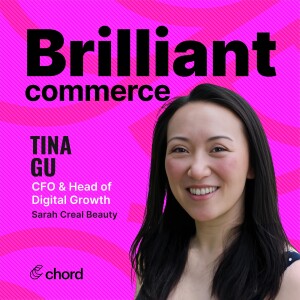
Thursday Jun 26, 2025
Thursday Jun 26, 2025
In this episode of Brilliant Commerce, Tina Gu, CFO & Head of Digital Growth at Sarah Creal Beauty, breaks down the strategic decisions behind building a beauty brand exclusively for women over 40. With M&A experience from Estee Lauder's major acquisition period (Le Labo, Frederic Malle, Glam Glow) and product marketing leadership at Meta, Tina discusses with Bryan why demographic focus creates stronger unit economics and how to structure operations for strategic exit potential.
Topics discussed:
How Estee Lauder's earn-out structures protected against founder departure risk, why Glam Glow failed expansion, and Rhode Beauty's $800M upfront deal structure mitigates post-acquisition growth risks.
Why Sarah Creal rejected younger demographics for higher volume, prioritizing lifetime value through repeatable purchase categories over trend-driven palette sales that create unsustainable acquisition costs.
Architecting D2C as centralized consumer intelligence hub rather than pure revenue channel to optimize Sephora placement, social content, and paid media targeting across the acquisition funnel.
AI adoption criteria focusing backend analytics and financial projections while maintaining human oversight for brand voice and customer experience where current AI quality remains insufficient.
Sarah demonstrating product application on real 40+ skin with formulation rationale and before/after results, eliminating the need for customers to research across Reddit and review sites.
Structuring operational fundamentals around strategic buyer evaluation criteria including product differentiation, consumer connection metrics, and purchase behavior data supporting premium multiple justification.
Why E.L.F. Beauty's Rhode acquisition signals smaller strategics pursuing margin expansion through luxury additions while major conglomerates focus on fixing existing brand performance issues.
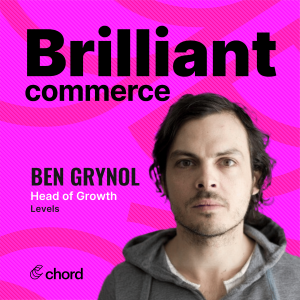
Wednesday Jun 11, 2025
Wednesday Jun 11, 2025
Ben Grynol, Head of Growth at Levels, offers a counterintuitive approach to commerce: building an entire health category through education rather than conversion-focused marketing. In this episode of Brilliant Commerce, Ben walks Bryan through how Levels achieved remarkably low customer acquisition costs ($50-80) for a high-consideration, $400 health device by rejecting traditional performance marketing in favor of deeply researched content. The strategy has produced extraordinary results: a 5:1 LTV:CAC ratio despite 60% of conversions happening after a full year of consideration.
Topics Discussed:
How Levels built the "metabolic health" category from scratch by becoming the authoritative information source first, creating hundreds of deeply researched articles without immediate conversion pressure.
Why Levels embraces a 12+ month nurturing process for their high-consideration product, focusing on building trust through value-first content rather than optimizing for quick conversion.
Levels' approach to evaluating marketing partners beyond last-click attribution, using metrics like website traffic spikes, email capture rates, and conversion patterns to assess true partner value.
Why Levels deliberately limits Meta ad spend, focusing only on retargeting specific partner traffic with email capture goals rather than bottom-funnel conversion.
How creating highly specific health content ensures visibility even as search behavior shifts from Google to AI agents by focusing on topics too niche for general summaries.
Leveraging lab results and health markers to create hyper-relevant lifecycle communications that drive approximately 30% of conversions through content that delivers genuine value.
Recognizing that their primary customer base (women 45-65+) may interact differently with technology, informing both content approach and platform strategy.
Ben's prediction that consumers increasingly value high-touch, expert-guided experiences where they pay for clear direction, creating new opportunities for brands to add value beyond products.
The unique challenges of marketing a product that goes under the skin, requires a prescription, and costs $400, requiring fundamentally different approaches than traditional consumer goods.
How Levels navigates health and wellness marketing without making medical claims, focusing on user experiences rather than promising specific outcomes.
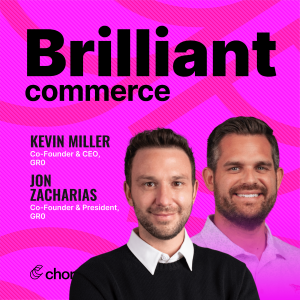
Wednesday May 28, 2025
Wednesday May 28, 2025
In an industry obsessed with paid media, GR0 co-founders Jon Zacharias, President, and Kevin Miller, CEO, identified a massive blind spot: iconic brands were spending millions on Meta ads without capturing the downstream organic searches they generated. As Jon points out, Theragun was spending $5 million in a month for half a million people to google “Is Theragun legit” or “percussive massage gun,” but they weren't even looking at what was happening after that. This insight became the foundation for an agency that revolutionized how ecommerce brands approach organic search.
Starting with a laser focus on SEO, they rapidly scaled to $20 million in revenue within their first year, employing 50 people by the 12-month mark. Their approach was fundamentally different: turning SEO into a performance marketing channel with clear revenue attribution. When iOS 14 privacy changes hit and acquisition costs soared, their model proved prescient. As Kevin explains, "It was a healthy correction because the products that didn't need to exist ceased to exist."
The changing landscape forced GR0 to evolve as well, strategically acquiring complementary agencies to become what Zacharias calls "the phone bill" of marketing services — the last expense a brand would cut when cash got tight. Their candid conversation highlights both the spectacular growth and painful lessons of scaling an agency during turbulent times, offering a masterclass in adaptability for commerce leaders.
Topics Discussed:
Transforming SEO into a measurable performance marketing channel by shifting from general visibility metrics to direct revenue attribution.
Strategic agency expansion during economic downturns by identifying which marketing functions are considered "essential utilities" to clients.
iOS 14's impact as a market correction mechanism that eliminated brands with poor product-market fit while strengthening companies with genuine customer value.
Building an agency team around "A players" by prioritizing attitude and hunger over pure technical expertise.
Using therapy as a business partnership tool to maintain founder alignment and have formalized communication processes during hypergrowth.
Leveraging AI to enhance agency margins through strategic implementation that makes humans more efficient rather than replacing them.
Creating ads that become "the last thing someone thinks about before bed" as the benchmark for creative effectiveness.
Using founder stories as the primary brand differentiator in crowded markets.
Implementing "delegation visualization" techniques from sports psychology to empower second-level management.
Leading AI adoption through demonstration rather than mandate by having executives use tools first and share results with teams.
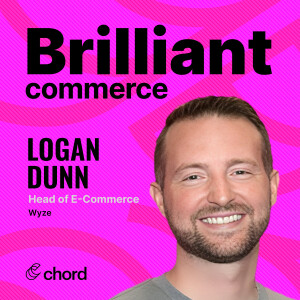
Wednesday May 14, 2025
Wednesday May 14, 2025
When your business model relies on cameras inside people's homes, trust isn't optional — it's everything. In this episode of Brilliant Commerce, Bryan speaks with Logan Dunn, Head of E-commerce at Wyze, about how the smart home disruptor is evolving beyond their initial "too good to be true" pricing strategy. After slashing camera prices from $200 to $20 and sparking a price war, Wyze now focuses on security and customer data management as competitive advantages in what Logan calls a "blood ocean" market.
Logan explains how they're implementing end-to-end encryption, two-factor authentication, and rigorous security protocols after learning hard lessons about customer trust. He offers a candid look at the challenges of managing a petabyte of customer data, the implementation of AI productivity tools like Glean, and why maintaining a single source of data truth is critical for any brand's success, especially when preparing for an AI-driven future.
The conversation explores the bifurcation of future commerce between AI automation for commodities and authentic social experiences for discovery, with Logan predicting significant growth in social commerce despite current hurdles in the US market. For marketers and e-commerce leaders, this episode provides valuable insights on balancing operational efficiency with authentic brand storytelling in an increasingly complex digital landscape.
Topics Discussed:
How Wyze transformed the industry by selling $200-equivalent cameras for $20, and why this "too good to be true" approach became a core company value.
Wyze's strategic shift to differentiate through enhanced security features like end-to-end encryption after competitors caught up to their pricing model.
Implementing security teams, penetration testing, bug bounty programs, and transparent communication to address the unique trust requirements of processing home video content.
The practical challenges of organizing massive data volumes and making them accessible through AI productivity tools like Glean.
How tools that connect disparate data sources through conversational interfaces are becoming a fundamental component of modern technology stacks.
Why Logan believes commerce will split between AI-handled commodity purchases and immersive brand discovery experiences through social platforms.
Why social commerce will continue expanding despite current limitations in US payment systems and concerns about AI-generated content authenticity.
How e-commerce platforms like Shopify can inadvertently expose customer data through third-party app integrations without proper security protocols.
Why investing early in centralized customer data management prevents costly identity resolution problems and enables AI implementation.
Determining when to develop proprietary solutions versus leveraging third-party tools, with security considerations as a primary factor.
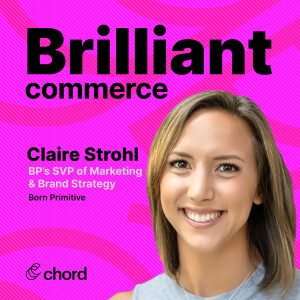
Wednesday Apr 16, 2025
Wednesday Apr 16, 2025
Forget the idea that direct-to-consumer is dead — it's just getting started. In this debut episode of Brilliant Commerce, Bryan Mahoney, Co-founder & CEO of Chord Commerce, explores how Born Primitive transformed from a garage startup making padded "snatch shorts" into an iconic fitness brand generating $11 million in veteran medical debt relief through purpose-driven marketing.
Claire Strohl, BP’s SVP of Marketing & Brand Strategy, shares their internal agency model that outperforms traditional partnerships, their systematic approach to product innovation based on athlete feedback, and their framework for balancing data analysis with brand intuition.
BP's veteran-founded DNA permeates everything from their talent strategy to their marketing initiatives that create branded moments outside the traditional retail calendar, demonstrating how authentic community connection drives both social impact and business growth with customer cohorts showing equivalent LTV regardless of acquisition channel.
Topics Discussed:
Transforming traditional agency relationships through the internal agency model that combines intimate brand knowledge with rapid creative execution, reducing external dependencies while maintaining consistent brand voice across evolving product categories.
Creating brand-owned shopping moments instead of competing with seasonal sales cycles through purpose-driven campaigns like the Veterans Day initiative that converted social impact into customer acquisition with equivalent 60-day LTV metrics to traditional channels.
Systematizing customer feedback loops to drive product innovation and category expansion beyond initial market segments, resulting in specialized performance gear that addresses specific athlete pain points while deepening community connection.
Implementing a data-informed rather than data-driven marketing framework that balances quantitative metrics with practitioner intuition, particularly when evaluating new channel performance and cohort behaviors around mission-driven initiatives.
Restructuring marketing strategy around customer journey touchpoints rather than channel distinctions to create seamless brand experiences regardless of where customers encounter the brand, eliminating the artificial divide between digital and traditional marketing.
Accelerating creative decision-making efficiency through structured internal communication protocols that give clear direction to creative teams without the ambiguity that typically plagues agency-client relationships.
Developing talent through methodologies that identify natural strengths and reallocates responsibilities to maximize both efficiency and career satisfaction while systematically challenging established processes even if only months old.
Combating content volume challenges through strategic implementation of AI for baseline optimization of routine marketing processes, creating bandwidth for the human-driven storytelling and emotional connection work that drives brand differentiation.

Wednesday Apr 02, 2025
Wednesday Apr 02, 2025
The commerce landscape has fundamentally shifted from best-of-breed components to consolidated data platforms — evidenced by brands increasingly requesting systems that eliminate conflicting dashboards rather than adding more specialized tools. In this episode of Brilliant Commerce, Bryan explores how venture capital firm M13 evolved from backing iconic consumer brands like Bonobos, Daily Harvest, and FabFitFun to investing exclusively in commerce infrastructure.
Partner Brent Murri shares why M13 initially passed on Chord but later led their funding round after witnessing how iconic brands like Sonos chose Chord's data platform, confirming that trustworthy data has become the non-negotiable foundation for effective AI implementation in an era where Adobe's research shows consumers increasingly use ChatGPT instead of Google for shopping research.
Topics Discussed:
How consolidation is defeating best-of-breed in commerce architecture as brands discover that adding specialized components creates unmanageable data problems rather than flexibility, leading to Chord's strategic pivot from requiring full replatforming to making their data platform work with existing infrastructure.
The emergence of the single source of truth as the critical prerequisite for AI success rather than the AI capabilities themselves, as iconic brands like Sonos and Ruggable report being forced to constantly cross-check multiple dashboards with contradictory metrics, undermining all downstream automation efforts.
Why Adobe's research on consumers using ChatGPT instead of Google demands retailers shift from traditional SEO to generative engine optimization where brands must become the answers themselves rather than competing for blue links, transforming how product content is structured.
Implementing the commerce bifurcation framework that strategically optimizes differently for utility purchases (increasingly AI-agent driven) versus discovery shopping (remaining human-centered), rather than treating all commerce interactions with the same approach.
How M13's interview technique for identifying truly AI-fluent talent goes beyond asking if candidates use ChatGPT to probing "what are your favorite AI applications?" and "how are you leveraging AI in your workflows?" to identify those who can accelerate organizational adoption.
The marketing copilot approach that elevates human marketers by providing AI-generated hypotheses while maintaining human decision-making at critical junctures, creating lethal and effective operators rather than replacing them with automation.
Strategically pivoting product positioning by focusing on the core strength (data infrastructure) that customers valued most rather than requiring full platform adoption, as exemplified by Chord's evolution from headless commerce platform to commerce data platform.
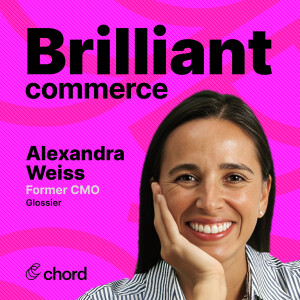
Wednesday Dec 11, 2024
Wednesday Dec 11, 2024
Welcome to Brilliant Commerce where we get real operators behind iconic brands around a table to discuss what actually makes these brands tick. As our host (and Founder/CEO) Bryan Mahoney puts it: "It's not magic. It's hard work."
In this second episode, Bryan sits down with Ali Weiss (former CMO of Glossier) to explore the evolution of direct-to-consumer marketing from the early days of social media through today's AI-powered landscape. As one of the architects behind Glossier's iconic brand building, Ali shares candid insights about creating authentic customer relationships at scale.
This conversation digs into both strategic and tactical approaches to brand building - from balancing qualitative and quantitative inputs to measuring customer experience effectively. Ali shares specific examples from her decade at Glossier, including memorable campaigns and how the team approached major retail moments like Black Friday.
Topics discussed:
The early days of D2C brand building and social media marketing
Creating the Glossier marketing playbook without traditional marketing experience
Evolution of Black Friday/holiday strategy as retail has become more omnichannel
How to balance performance marketing with long-term brand building
Practical approaches to measuring customer experience beyond NPS
The role of data in creative decision making - being "data informed" vs "data driven"
Managing major brand campaigns like Body Hero launch
Current views on AI's impact on marketing and importance of human oversight
Finding the right mix of qualitative and quantitative inputs for marketing decisions
Specific examples of reactivating hero products effectively
The critical balance between brand vision and customer voice
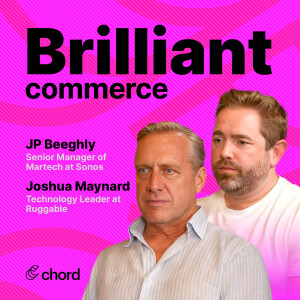
Monday Oct 28, 2024
Monday Oct 28, 2024
Welcome to Brilliant Commerce where we get real operators behind iconic brands around a table to discuss what actually makes these brands tick. As our host (and Founder/CEO) Bryan Mahoney puts it: "It's not magic. It's hard work."
In this first episode, Bryan sits down with JP Beegley (Senior Manager of MarTech at Sonos) and Josh Maynard (Technology Leader at Ruggable) to discuss how they're evolving their tech stacks, managing customer data, and breaking down silos between marketing and technology teams.
This conversation digs into how two leading brands are tackling current commerce challenges - from moving away from third-party data dependence to enabling true self-service capabilities for internal teams. Both guests share candid insights from their transitions from agency life to in-house operations, and how they're approaching the increasing complexity of the marketing technology landscape.
Topics discussed:
Real talk about CDP implementation - why both brands needed "more than a CDP" and how they're using it
Practical approaches to breaking down marketing/tech silos and enabling true cross-functional collaboration
Moving from "submit a ticket, wait 6 weeks" to actual self-service for marketing teams
How to evaluate and embed agency partners effectively when you're resource-constrained
Balancing customer data collection with privacy and control
Q4 preparation strategies from both a marketing and infrastructure perspective
The shift from pure performance marketing to strategies that build long-term brand value
Specific examples of reducing implementation time from 6 months to 3 weeks through better tooling and collaboration


